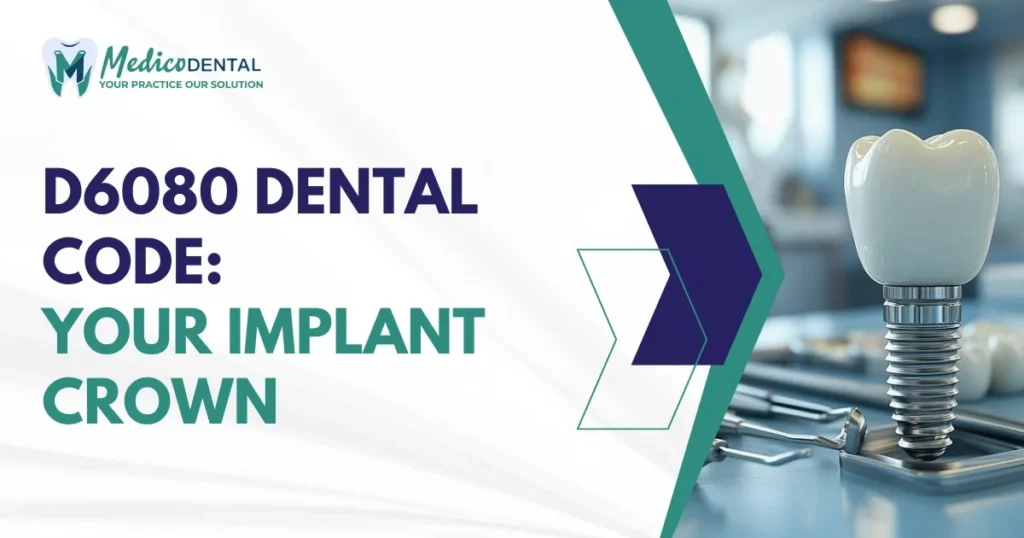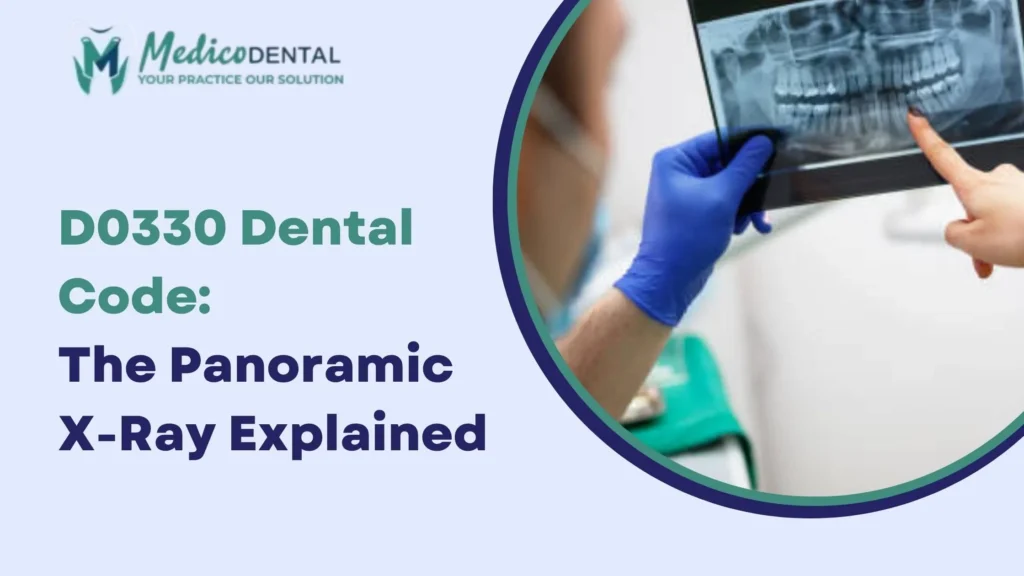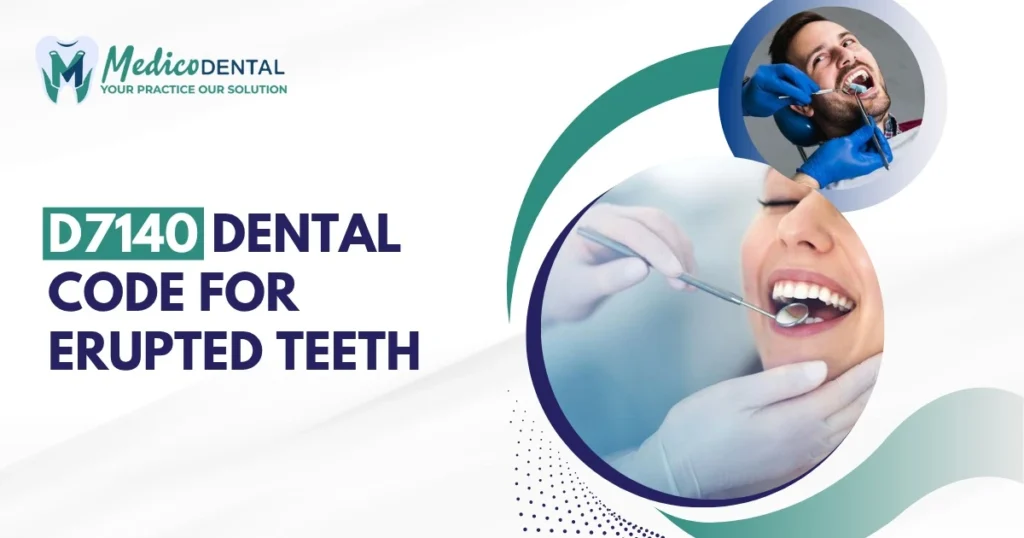The D6080 Dental Code is a vital code in dental billing that is used to define implant maintenance procedures, ensuring that these procedures are properly documented and reimbursed. This code specifically applies to the maintenance of implant supported prostheses, helping dental professionals and patients understand the importance of keeping these implants in top condition. It is essential for both the dentist and the patient to understand what is covered under this code and what is excluded to avoid confusion or billing issues.
What is the D6080 Dental Code?
The D6080 Dental Code refers to a specific procedure used in implant maintenance. It is used when an implant supported fixed or removable prosthesis needs to be removed for cleaning and maintenance. This code is important for dental billing because it helps to clearly define the maintenance activities that are performed on the prostheses, such as removal, cleaning, and reinsertion. It ensures that these activities are documented accurately for insurance purposes and reimbursement.
Understanding Implant Maintenance Procedures
The D6080 code covers several crucial procedures involved in maintaining an implant supported prosthesis:
Removal
This procedure involves the dentist removing the prosthesis from the implant for cleaning and inspection. The removal is necessary to ensure that the implant is not damaged and that any issues with the prosthesis can be addressed.
Cleaning
Once the prosthesis is removed, it is cleaned thoroughly. This cleaning involves removing plaque, tartar, and other debris that can accumulate on the implant and the prosthesis. Regular cleaning helps prevent infection and ensures the longevity of the implant.
Reinsertion
After cleaning, the prosthesis is carefully reinserted into place, ensuring that it is properly fitted and functioning as expected.
Maintenance
Maintenance under the D6080 code also includes instructions for patients on how to care for their implants and prostheses. This ensures the patient is well informed about proper hygiene practices to keep the implant in good condition.
When is D6080 Used?
The D6080 code is typically used in scenarios where there is a need for regular maintenance of an implant supported prosthesis. This can include:
- Routine maintenance: For patients who have implants as part of their dental restoration and require periodic maintenance.
- Cleaning and reinsertion: When a patient experiences discomfort or notices a problem with their prosthesis, the dentist may need to remove, clean, and reinstate it to ensure proper function.
- After long term wear: Prostheses may need to be cleaned and maintained after extended use to prevent issues such as loosening, infection, or wear and tear.
What Does D6080 Include?
The D6080 code covers several key maintenance activities:
- Removal of the prosthesis from the implant.
- Cleaning of the prosthesis and abutments.
- Reinsertion of the prosthesis back into place after cleaning.
- Patient instructions on how to maintain the implant and prosthesis properly to avoid complications in the future.
However, it is important to note that D6080 is a maintenance procedure and does not cover surgical aspects of implant placement or removal.
What is Not Included in D6080?
While the D6080 code covers specific maintenance tasks, there are certain procedures and services that are not included under this code:
Surgical Procedures
Any surgical work required for placing or removing implants or prostheses is not covered under this code. For example, implant placement surgery, bone grafting, or removal of the implant itself would require separate codes.
Repair Work
If the prosthesis is damaged and needs to be repaired, this would require a different code. D6080 only covers cleaning and reinsertion, not repairs or replacements.
Restorative Procedures
Any restorative work, such as adjustments to the implant or replacement of components like the abutment, is outside the scope of D6080.
It’s essential for both the dentist and patient to be aware of these exclusions to ensure that appropriate codes are used for services outside of the D6080 maintenance procedures.
Insurance Coverage for D6080
Insurance coverage for the D6080 Dental Code can vary significantly from one plan to another. While some dental insurance plans may fully cover the procedure, others may only cover part of the cost, or none at all. Typically, the D6080 code is considered a maintenance procedure, which means it might not be as extensively covered as initial implant surgeries or restorations. Some insurance plans may require that the patient meets certain conditions, such as demonstrating that the implant has been in place for a set amount of time, before they will approve coverage for the procedure. Additionally, patients with comprehensive dental insurance plans may find that the cost of maintenance procedures like D6080 is more readily covered, while those with more limited plans might have higher out of pocket costs.
Before undergoing any procedure involving the D6080 code, it is highly recommended that patients check with their insurance providers to verify coverage details and understand their potential out of pocket expenses.
Example of D6080 in Action
Let’s consider a real life scenario where the D6080 code comes into play. Imagine a patient named Jane, who received implant supported dentures two years ago. Over time, she notices some discomfort and slight looseness in the denture. During a routine check up, her dentist diagnoses that plaque buildup and minor wear on the abutments are the causes. Using the D6080 code, the dentist removes the prosthesis for a thorough cleaning, ensuring the implant and abutments are free of plaque and debris. After the cleaning, the prosthesis is carefully reinserted, and Jane is given detailed instructions on how to maintain the implants going forward. This procedure would be documented using the D6080 code, ensuring that both Jane and her insurance provider and insurance credentialing understand what was done and that she receives any eligible reimbursement for the maintenance work performed.
Patient Care and Instructions for Implant Maintenance
After the procedure, it is crucial for patients to follow proper care instructions to ensure the longevity and effectiveness of their implants. Here are some general guidelines that dental professionals should provide to their patients following a D6080 procedure:
Regular Cleaning
Patients should brush their implant and prosthesis regularly with a soft toothbrush and non abrasive toothpaste. It is important to clean around the implant site to prevent plaque buildup.
Flossing
Special floss or interdental brushes may be recommended to clean between the prosthesis and gums to ensure that food particles and plaque do not accumulate.
Avoid Hard Foods
To prevent unnecessary pressure on the implant and prosthesis, patients should avoid chewing on hard foods or objects that could damage the components.
Routine Check up
Regular visits to the dentist are essential to monitor the health of the implant and the surrounding tissues. Regular professional cleanings are also vital to maintain the overall health of the implant.
By following these instructions, patients can avoid complications such as infection or loosening of the prosthesis, ensuring that the implant functions well for years.
Conclusion
The D6080 Dental Code is an important tool in maintaining implant supported prostheses, and understanding it is crucial for both dental professionals and patients. For dentists, it is vital to correctly use this code to ensure proper documentation of maintenance procedures, including removal, cleaning, reinsertion, and patient education. For patients, understanding what is included under the D6080 code and how insurance coverage may apply can help avoid unexpected costs. Regular maintenance of dental implants is essential for the longevity of the prosthesis and the overall health of the implant, so proper care following the D6080 procedure is necessary to ensure optimal results.
FAQs
Does insurance cover the full cost of the D6080 procedure?
Ans. Insurance coverage varies. While some plans may cover the full cost, others may offer partial reimbursement or require the patient to pay a portion of the cost. Always check with your insurance provider before the procedure.
Is the D6080 code applicable for all implant types?
Ans. Yes, the D6080 code can be used for all types of implant supported prostheses, whether they are fixed or removable. However, the procedure must involve the removal, cleaning, and reinsertion of the prosthesis for the code to apply.
Can the D6080 procedure be done at home?
Ans. No, the D6080 procedure must be performed by a licensed dental professional in a dental office. Cleaning and reinsertion of implant supported prostheses require professional expertise to avoid damage or complications.
How often should the D6080 procedure be performed?
Ans. The frequency of maintenance procedures like D6080 depends on the patient’s individual needs and the condition of the implants. Some patients may require maintenance annually, while others might need it less frequently, based on their oral health and the wear on the prosthesis.
What happens if I don’t have the D6080 procedure?
Ans. Neglecting implant maintenance can lead to complications such as infection, loosening of the prosthesis, or damage to the implant. Regular maintenance helps prevent these issues and ensures that the implant functions as intended.



